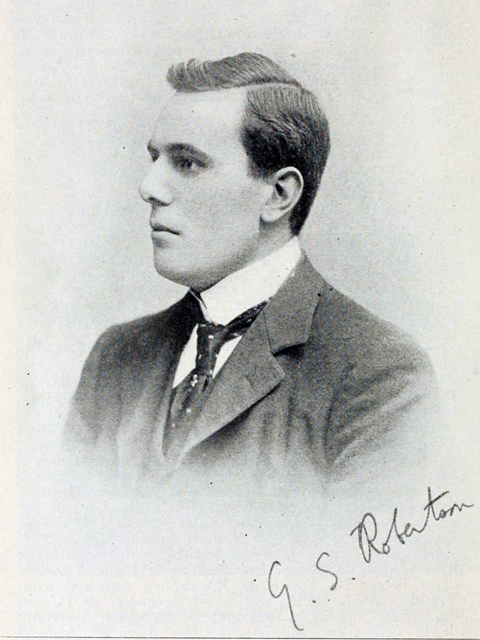
| Roles | Competed in Olympic Games • Non-starter |
|---|---|
| Sex | Male |
| Full name | George Stuart•Robertson |
| Used name | George Stuart•Robertson |
| Born | 25 May 1872 in London, England (GBR) |
| Died | 29 January 1967 (aged 94 years 8 months 4 days) in London, England (GBR) |
| Affiliations | University of Oxford, Oxford (GBR) |
| NOC |  Great Britain Great Britain |
| Medals | OG |
| Gold | 0 |
| Silver | 0 |
| Bronze | 1 |
| Total | 1 |
George Robertson won the hammer throw for Oxford vs. Cambridge three times (1893-95), and also for Oxford vs. Yale and the London Athletic Club, of which he was a vice-president, vs. New York AC, but unfortunately the event was not included on the program of the 1896 Olympics. Instead, Robertson entered the discus and finished fourth, his performance being described as “neither elegant nor successful.” His mark of 82-8 (25.19) is considered the inaugural UK record for the discus. Some sources suggest that Robertson also competed in the shot in Athinai, but the balance of the evidence suggests that this is unlikely, and The Field reported that “Robertson stood out of the weight putting, in which he might be presumed to have made a respectable appearance. Probably his time was too much occupied by the composition of his Greek ode.” As Robertson was the correspondent in Athinai for The Field he sent in this report himself. He did, however, play in the lawn tennis tournament, but his most notable achievement at the Games was to compose and recite a Pindaric ode in classical Greek before the King of Greece, for which he was rewarded with a laurel branch and subsequent investiture as a Knight if the Order of the Saviour of Greece. Although a keen Olympian, Robertson was not convinced, at least in his early years, of the value of the Olympic Movement as a peaceful influence. Writing in 1901 of the 1896 Games he expressed the view that “Politically, the Games undoubtedly did much to produce the subsequent war with Turkey.”
Robertson was educated at Winchester before getting a scholarship to New College, Oxford. In 1899 he was called to the Bar by the Middle Temple and he joined the Oxford Circuit. He wrote various books about legal matters and proceedings and in 1907 he was appointed to the General Council of the Bar. In 1912 he was appointed the Chief Registrar of Friendly Societies and following the Industrial Assurance Act of 1923 he became the first Industrial Assurance Commissioner, a post he held until retiring from public life in 1937. He was knighted in 1928 and when he died, aged 94, he was the last surviving British competitor from the first Modern Olympic Games.
Personal Bests: DT – 25.19 (82-8) (1896); HT – 36.93 (121-2) (1897).
| Games | Discipline (Sport) / Event | NOC / Team | Pos | Medal | As | |
|---|---|---|---|---|---|---|
| 1896 Summer Olympics | Athletics |  GBR GBR |
George Stuart Robertson | |||
| Shot Put, Men (Olympic) | ||||||
| Discus Throw, Men (Olympic) | 4 | |||||
| Tennis |  GBR GBR |
George Stuart Robertson | ||||
| Singles, Men (Olympic) | =8 | |||||
| Doubles, Men (Olympic) | Teddy Flack | 3 | Bronze | |||
| 1906 Intercalated Games | Athletics |  GBR GBR |
George Stuart Robertson | |||
| Discus Throw, Men (Intercalated) | ||||||
| Discus Throw, Greek Style, Men (Intercalated) |